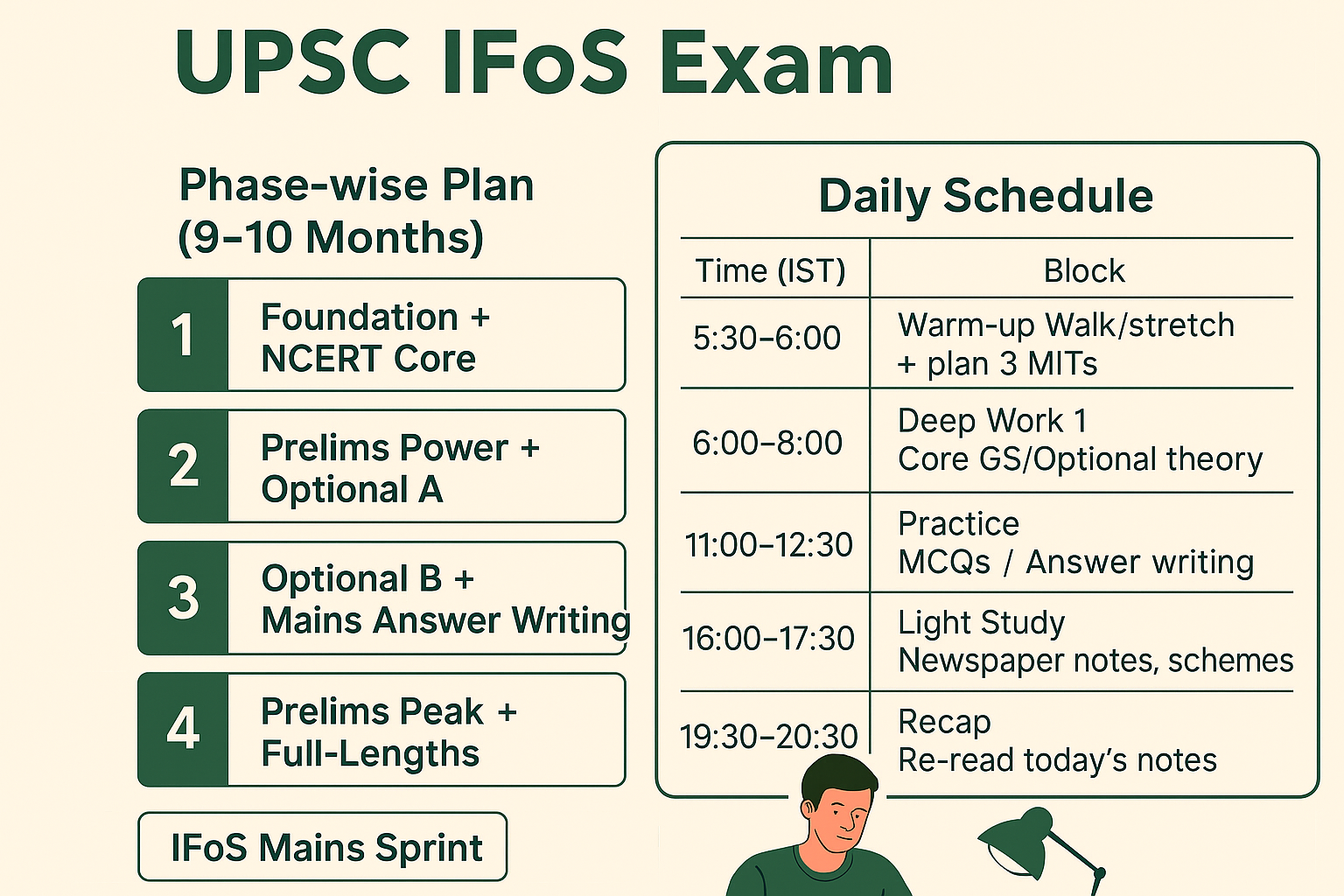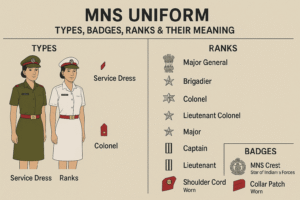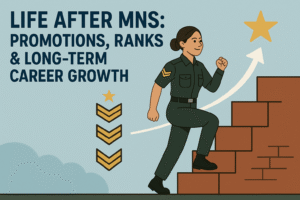If you’re starting from zero, this blueprint shows exactly what to study, when to study, and how to revise for the UPSC Indian Forest Service (IFoS). You can follow it self-guided or alongside the best forest service coaching institute in india. I’ll give you phase-wise planning, weekly targets, hour-by-hour day plans, and revision loops—plus a crash plan if you’re short on time.
Quick note: IFoS has a common Prelims with CSE (GS + CSAT), then a separate Mains (6 descriptive papers including two Optionals from the notified list), followed by Interview/Personality Test.
Pillars of a High-ROI IFoS Strategy
Syllabus-first mindset: Print the syllabus and tick topics as you finish.
PYQs as your compass: Work with the last 10 years’ Prelims & IFoS Mains PYQs to define depth and focus.
NCERT foundations: Class 6–12 (Geo, Sci, Env, Econ basics, Polity civics portions) → short notes.
Standard sources, not too many: One core book per subject + one revision-friendly note set.
Test early, revise often: Weekly mini-tests + monthly full-lengths.
Active recall + spaced repetition: Flashcards, 1-7-30 day revision loop.
Optional mastery: Choose optionals aligned with your degree/strengths and availability of material & PYQs.
Fitness & field awareness: Basic endurance, map-work, ecology vocabulary, and conservation case studies.
For guided execution, mentorship from the best forest service coaching institute in india can shrink trial-and-error time, especially for optionals and answer-writing feedback.
9–10 Month Master Plan (From Zero)
Phase 1 (Weeks 1–8): Foundation + NCERT Core
Targets
NCERTs 6–12 (Geo, Sci, Env, Polity basics, Economy basics, History overview).
Daily newspaper + weekly environment magazine brief (make 10 bullet notes/week).
Pick and lock your two optionals; gather PYQs & official syllabus.
Outputs
Concise NCERT notes (≤150 pages total).
PYQ map (what repeats, what depth).
Tip: Many aspirants coordinate this stage with the best forest service coaching institute in india to fix booklists and optional choices quickly.
Phase 2 (Weeks 9–20): Prelims Power + Optional A (Paper I & II)
Targets
GS Prelims: Polity, Economy, Environment, Geography in rotation.
CSAT: 3 sessions/week (comprehension + basic quant + reasoning).
Optional A: finish Paper I syllabus, start Paper II themes.
Tests: 1 sectional test each week.
Outputs
Error book for MCQs.
2 notebook volumes for Optional A (paper-wise).
Phase 3 (Weeks 21–32): Optional B + Mains Answer Writing
Targets
Optional B full coverage (both papers).
Mains GS basics (Ethics caselets once a week, concise GS notes).
Tests: Weekly optional tests; fortnightly GS mains mini-tests (10-question sets).
Outputs
2 notebook volumes for Optional B.
30–40 good answers per GS paper.
Phase 4 (Weeks 33–40): Prelims Peak + Full-Lengths
Targets
Prelims full-length tests (GS + CSAT) every weekend.
Daily mixed-topic MCQ drills (50–70 Qs/day).
Revise environment & mapping heavily.
Outputs
Stabilized Prelims accuracy and time control.
Phase 5 (Weeks 41–44+): IFoS Mains Sprint (Post-Prelims)
Targets
Consolidate both Optionals + GS Paper-wise writing practice.
2–3 full-length optionals/week + 1 GS Paper/week.
Ethics, forestry case studies, conservation policies, Acts & institutions.
Outputs
Paper-wise answer templates and case-study library.
Throughout, leverage mentoring and peer review—joining the best forest service coaching institute in india for structured tests and quick feedback can be decisive.
Daily Schedules You Can Use Today
A) Full-Time Aspirant (8.5–10 hours net study)
| Time (IST) | Block | What to do |
|---|---|---|
| 5:30–6:00 | Warm-up | Walk/stretch + plan 3 MITs (Most Important Tasks) |
| 6:00–8:00 | Deep Work 1 | Core GS/Optional theory (no phone, no music) |
| 8:00–8:30 | Break | Breakfast |
| 8:30–10:30 | Deep Work 2 | PYQs/topic-wise notes/diagrams/maps |
| 10:30–11:00 | Micro-Rev | Flashcards (1-7-30 loop) |
| 11:00–12:30 | Practice | MCQs (on weekdays) / Answer writing (on alt. days) |
| 12:30–13:30 | Break | Lunch + power nap (20 min) |
| 13:30–15:30 | Deep Work 3 | Optional A/B heavy topic |
| 15:30–16:00 | Break | Tea + quick walk |
| 16:00–17:30 | Light Study | Newspaper notes, schemes, Env/Acts summaries |
| 17:30–18:00 | Fitness | Jog/skip/HIIT (important for IFoS mindset) |
| 19:30–20:30 | Recap | Re-read today’s notes; plan tomorrow; shutdown ritual |
Where to get guidance? Many students keep these blocks but plug in faculty tasks and tests from the best forest service coaching institute in india for tighter accountability.
B) Working Professional (4–6 hours net study)
| Time (IST) | Block | What to do |
|---|---|---|
| 5:30–7:30 | Deep Work | GS/Optional core (alternate days for each) |
| 13:30–14:00 | Micro | Flashcards + 10 MCQs |
| 20:00–22:00 | Practice | PYQs, answer writing (short), or sectional tests (alt. days) |
| Weekend | Long Blocks | 2 full-length tests + weekly revision cycle |
Weekly Cadence (Mon–Sun)
Mon–Thu: Heavy theory + PYQs (GS + one Optional in rotation).
Fri: CSAT + Ethics/Case studies (2–3 hrs).
Sat: Revision marathon (mind-maps, charts, laws/conventions, forestry/eco case studies).
Sun: Full-length test (Prelims or Mains/Optional) in exam conditions + detailed post-test analysis.
Joining test series from the best forest service coaching institute in india ensures calibrated difficulty and timely feedback.
4–5 Month Crash Plan (If time is short)
Month 1: NCERT sweep + GS core outlines + choose Optionals; start PYQs.
Month 2: GS Prelims heavy + Optional A Paper I; weekly tests.
Month 3: Optional A Paper II + Optional B Paper I; start answer-writing.
Month 4: Optional B Paper II + Prelims full-lengths every weekend.
Month 5 (post-Prelims): Mains drills—2 optional FLTs/week + 1 GS FLT/week.
A compact plan works better with curated materials; many take help from the best forest service coaching institute in india to avoid resource overload.
How to Choose Your Optionals (Quick Framework)
Background fit: Degree/strongest subjects win.
Syllabus clarity & PYQ patterns: Prefer predictable, well-documented trends.
Material & mentorship: Availability of notes, test series, and answer keys (the best forest service coaching institute in india often provides structured, paper-wise mentorship).
Scoring style: Balance conceptual + factual; prepare case studies/examples.
Prelims Playbook (GS + CSAT)
GS: Environment (very high yield), Polity basics, Economy fundamentals, Geography (maps), Modern History essentials.
CSAT: Practice thrice a week even if you’re strong; timer discipline is critical.
MCQ technique: Elimination, trend awareness, risk management, and error-book maintenance.
Mains Playbook (GS + Two Optionals)
Answer structure: Intro (definition/context), Body (sub-headings, diagrams/flowcharts/maps), Conclusion (way forward).
Case studies: Forestry/eco-restoration, wildlife corridors, human-wildlife conflict mitigation, climate-smart practices, community forestry.
Data bank: Acts, policies, schemes, institutions, recent reports (keep a 10-page quick reference).
Tests: Paper-wise cycles + iterative feedback. The best forest service coaching institute in india can compress this with paper-specific review sessions.
Note-Making & Revision System
Golden 3: Capture → Distill → Express.
1-7-30 Loop: Revisit notes after 1 day, 7 days, 30 days (tag in your planner).
Error Book: One for MCQs, one for Mains. Update after every test.
Fitness & Mindset
Daily 20–30 mins: Jogging/Skipping/HIIT + mobility.
Weekly trek/long walk: Build endurance and observational skills (flora/fauna/landforms).
Mindfulness (5–10 mins): Keeps recall sharp and anxiety low.
Minimal, High-Trust Resource Map
NCERT 6–12: Geo, Sci, Polity basics, Economy basics, Environment.
One core book per GS area (keep your list lean).
Optional material: University-grade texts, curated notes, PYQs.
Tests: Calibrated full-lengths from the best forest service coaching institute in india or equivalent.
Common Pitfalls (Avoid These)
Hoarding PDFs; not revising.
Ignoring CSAT until the end.
Doing tests without post-test analysis.
Switching optionals late.
Writing answers without structure, diagrams, or keywords.
10-Point Execution Checklist
Printed syllabus & 10-year PYQs.
Fixed booklist (≤ 1–2 per subject).
Daily time blocks (deep work + practice + revision).
Weekly test + analysis slot.
Error books (MCQ & Mains).
Flashcard stack for formulas/acts/definitions.
Map-work routine (2–3 times/week).
Fitness habit.
Monthly audit of progress.
Mentor feedback—ideally from the best forest service coaching institute in india.
FAQs (SEO-Optimized)
1) Can I clear IFoS starting from absolute zero?
Yes—with a phase-wise plan, disciplined revision, and consistent testing. Many students accelerate progress by joining the best forest service coaching institute in india for structure and feedback.
2) How many hours should I study daily?
Full-time: 8–10 focused hours; working professionals: 4–6 hours. Quality beats quantity—guidance from the best forest service coaching institute in india helps you use hours smarter.
3) What’s a realistic timeline?
9–10 months from zero is ideal; a 4–5 month crash plan is possible with high discipline or support from the best forest service coaching institute in india.
4) How do I choose my optionals?
Pick subjects you can sustain—availability of PYQs/material/mentors matters. The best forest service coaching institute in india can audit your strengths and suggest the fit.
5) How important is CSAT?
Crucial—failing CSAT ends the attempt. Practice 3 days/week. The best forest service coaching institute in india typically runs CSAT diagnostics early.
6) Do I need coaching?
Not mandatory, but structured tests, reviews, and peers from the best forest service coaching institute in india reduce trial-and-error.
7) How often should I give tests?
Weekly sectionals + monthly full-lengths pre-Prelims; post-Prelims, 2–3 Mains full-lengths/week. Many follow schedules issued by the best forest service coaching institute in india.
8) How do I manage notes?
One master notebook per subject + digital flashcards. A good habit taught at the best forest service coaching institute in india is maintaining an error book after every test.
9) What if I’m weak in Maths/Reasoning for CSAT?
Start early with basics, timed sets, and topic-wise drills. Doubt-clearing at the best forest service coaching institute in india can speed this up.
10) How do I balance Prelims and Mains?
Until 2 months before Prelims: 60% GS/CSAT, 40% Optionals. Last 60 days: Prelims-first. Post-Prelims: Mains-only. Many follow trackers provided by the best forest service coaching institute in india.
11) How should I prepare current affairs for IFoS?
Daily newspaper, monthly compilations, and a one-page updates log for forestry/wildlife/eco-policies. The best forest service coaching institute in india often curates a focused eco-compilation.
12) How do I keep motivation high?
Weekly progress audits, peer group, and mentor check-ins. Many rely on the accountability systems of the best forest service coaching institute in india.
Final Word
This plan is built for focus and momentum—fewer sources, deeper revision, consistent testing. Adopt the daily schedule that fits your life, lock your optionals, and move in phases. If you want structured hand-holding, mock analysis, and crisp feedback loops, partner with the best forest service coaching institute in india to compress your learning curve.






